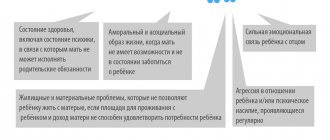The legislative framework
The specifics of relations between relatives are regulated by the Family Code of Russia. The procedure for communicating with a child is prescribed in Article No. 66 of the RF IC . Also, disputes about children are regulated by Plenum Resolution No. 10 of 1998. Much useful information can be gleaned from the review of judicial practice approved by the Presidium of the Supreme Court in 2011.
The main provisions of Article No. 66 of the Family Code:
- A parent who lives separately can walk with the child, raise and teach him;
- The father or mother with whom the child lives is prohibited from preventing the ex-spouse from seeing their child, unless the visits cause moral or physical discomfort or interfere with moral standards;
- Parents can voluntarily sign a pre-agreed agreement that sets out a schedule for communicating with the child;
- If the former spouses cannot reach an agreement, the decision is made by the court with the obligatory presence of representatives of the guardianship and trusteeship authorities.
How to write a statement correctly: requirements for form and content
To write an application to the guardianship authority, you must understand that no special forms are provided for them; the application is written in free form. There are some requirements for the content and indication of information in the appeal. This type of statement is a petition, an appeal to the authorized bodies.
So, the application must contain the following information:
- the name of the body to which the appeal is being made - usually the head, chief, director is indicated;
- the applicant’s personal data – surname, initials, passport details and place of registration;
- title of the document – APPLICATION;
- Next, the data of the parent who is preventing communication, information about marriage (date) or other, as well as data about divorce, if any, are indicated.;
- the details of the minor are indicated - date of birth, what he does (attends kindergarten or school and other important characteristics);
- then the essence of the conflict itself is described, what the problem actually is;
- in conclusion indicate a request for help and assistance in resolving the current conflict;
- You can indicate your proposals for getting out of a conflict situation;
- The date of preparation of the document is indicated and a signature is placed.
A statement is an appeal that must contain maximum information on this case, indicating all the circumstances that occurred when problematic situations arose, including the psychological state of the child during meetings with the parent.
The application must be accompanied by documents confirming the birth of the child or a copy of the page from the passport containing information about the child. In addition, the statement indicates the reason for the conflict or problems that impede communication.
When describing the solution to the problem on the part of the applicant, the time of communication that could suit the applicant is indicated. These may be weekends or holidays, holidays, certain days of the week in accordance with working hours.
Dear readers! To solve your problem right now, get a free consultation
— contact the on-duty lawyer in the online chat on the right or call:
+7
— Moscow and region.
+7
— St. Petersburg and region.
8
- Other regions of the Russian Federation
You will not need to waste your time and nerves
- an experienced lawyer will take care of solving all your problems!
Determining the procedure for communicating with a child in court
When it is not possible to reach a peaceful agreement, the dispute will have to be resolved at court hearings. The initiator of the procedure is usually the parent who is prevented from communicating with the child. Several hearings are held that last at least 2 months, after which a court ruling is issued.
Subject of proof
The subject of evidence is a list of circumstances that the judge must take into account when making a final decision. First of all, the interests of the child are taken into account . The court's ruling seeks to find a compromise that will satisfy both parties.
If communication with a parent who lives separately could harm the child, then the court prohibits him from fulfilling his parental responsibilities. The plaintiff must prove that staying with him is absolutely safe, and his housing has the necessary conditions for the stay of a minor.
Jurisdiction of the claim
The application must be submitted at the place of registration of the defendant to the district court office. This rule is regulated by Article No. 28 of the Civil Procedure Code of Russia.
State duty
Cases involving children are considered free of charge. Withholding any payment in such situations is illegal.
Evgeniy Baidalin
Family Lawyer. More than 10 years of experience
Ask a Question
But in practice, some federal courts classify the requirement to remove obstacles to communication with a child and determine the order of communication as non-property disputes with payment of a state fee of 300 rubles. I believe that this approach of the courts is not correct.
Communication with a child after divorce: legal regulation, rights and responsibilities of parents
Family law establishes that mother and father have equal parental rights and bear equal responsibilities. In this case, parental rights terminate when the child reaches the age of majority or when he acquires full legal capacity before reaching the age of majority.
Accordingly, the legislator does not provide for divorce as a basis for terminating the parental rights of one of the parents. This fact means that the parent retains his rights and responsibilities for the upbringing and financial support of the child.
A parent living separately from a child has the right to:
- receive information about the child’s health, upbringing, education, and pastime;
- participate in raising a child after divorce;
- resolve issues that are important to the child together with the other parent;
- communicate with your child and spend time together.
In addition, a parent who does not live with the child has the right to receive information about the child from educational, medical and other organizations. However, the organization may refuse to provide such information only if there is a real threat to the life of the child from the parent.
At the same time, the parent living separately has the following responsibilities:
- protects the rights and interests of his child, including acting as a legal representative in relations with individuals and legal entities, in the courts;
- takes care of physical and psychological health, as well as
spiritual and moral development of children;
- is involved in raising a child;
- ensures that children receive general education;
- provides financially for his child by paying alimony or in any other way;
After a divorce, communication between parent and child consists of face-to-face meetings, phone calls, text messages or video calls. In addition to parents, the child also has the right to communicate with other relatives (grandparents, sister, brother, uncle, aunt and others).
It is important to know : moving a parent to another country does not terminate his rights to communicate and participate in the upbringing of his child.
Circumstances influencing the court's decision
The Resolution of the Plenum and the review of practice describe in detail the circumstances that the court takes into account when considering the case. The list of provisions may be supplemented depending on the specific situation.
Circumstances influencing the court's decision:
- Age. The court will not allow an infant to be taken away for several days. Older children can be taken on weekends. The older the minor, the higher the chance of achieving joint custody.
- Health features. If a child requires special care, the parent must prove that they can provide the necessary conditions.
- Availability of conditions for living, education and training. This factor is very important if the child stays for several days. It is important that the house has the necessary furniture, toys, books, etc.
- Schedule of visits to school, clubs, and various educational institutions. If a parent lives far from the location of these organizations, then the child will not be able to stay with him on weekdays.
- The distance between the places of residence of the former spouses. If a parent lives several hundred kilometers away, the child will only be able to visit him during the holidays.
- Parent-child relationship. If they have not communicated for a long time, then meetings are first held in the presence of the second spouse.
Circumstances to be clarified
The list of circumstances that may be the subject of discussion in court is given according to the Resolution of the Plenum of the Supreme Court of the Russian Federation “On the application of legislation by courts in resolving disputes related to the upbringing of children” and the Review of the practice of resolving disputes related to the upbringing of children by courts.
Taking into account the specific facts of the case, their list can be expanded. So, the court takes into account the following circumstances that are important for resolving the dispute.
Age and health status of the child
First of all, the court will examine the question of whether his health condition interferes with communication with the other parent. In this case, age is also of great importance.
For example, it is extremely unlikely that the court will recognize the right of a father to take a breastfed child with him on weekends. It is most likely that they will see each other at the mother’s place of residence and only in her presence.
At an older age, the chances of taking children on weekends increase. In principle, after the baby switches to general nutrition, it is possible to take him away for the weekend and the court often satisfies such requirements.
The older the age, the greater the likelihood of establishing a communication schedule that involves meetings and the child staying with the father, excluding the presence of the other parent.
Availability of conditions for education and development
The availability of conditions for upbringing and development is an important factor if the child will spend the night not at home.
For this there must be:
- living space;
- sleeping area;
- toys;
- books;
- Food.
A separate room and other living conditions that promote the psychological and physical development of the minor’s health are welcome.
Schoolchild's daily routine
If a child attends an educational institution, and a parent asks the court to allow him to stay overnight on weekdays, then there must be conditions that allow him to go to school without prejudice to his interests.
We recommend! Disputes about children during divorce
Even if these conditions are present, it is not a fact that the court will agree that the student’s stay at his father’s house on weekdays is in his interests.
Distance between the plaintiff’s actual residence and the child’s place of residence
It is not uncommon for a parent to live hundreds of kilometers away. The court cannot ignore this circumstance.
It is unlikely that long weekly trips will correspond to the interests of the child. In this situation, meetings will most likely have to be limited to vacations.
One of the options for solving the problem is to establish the child’s place of residence in court.
Length of time during which the child had no contact with parents
What matters here is the degree of attachment to the father. If the son or daughter has not previously communicated with him, then leaving him alone is often not in their interests and can negatively affect their psyche.
Initially, meetings are permissible in the presence of the mother, and as adaptation progresses, communication in private will also be possible.
Psychological and psychiatric examination
A psychological and psychiatric examination may be prescribed if it is necessary to determine the relationship between the child and parents and the degree of attachment to each of them.
For example, the mother with whom the child lives may argue that establishing visits with the father is contrary to his interests because he is afraid of him.
To confirm or refute this circumstance, an examination may be appointed.
Requirements for parents
The parent must have housing with all the necessary conditions for the child. Your own or rented apartment, a relative’s house, premises provided for temporary or permanent use are suitable. Having a regular income is also important. Money is required to support a minor.
For children, there is a separate bed, a table for doing homework, space in the closet for clothes, etc. There must also be books, toys and food for the minor. The exact conditions are determined by the age and needs of the child.
You will need to provide compelling arguments that communication with the parent does not harm the interests of the children . It is enough to provide a reference from your superiors and neighbors. The second party can refute the evidence with the help of a criminal record certificate or administrative liability. The testimony of invited witnesses is also taken into account.
Carrying out examinations
To determine the closeness of children and parents, a psychological and psychiatric examination is prescribed. If the applicant or defendant claims that the other party negatively influences the child and instills fear in him, then to refute this circumstance, a psychologist and teacher talk with the minor and conduct several simple tests. Parents are prohibited from attending the examination .
Are children's opinions taken into account?
A child over 10 years of age has the right to express his opinion on issues that affect his interests. The exception is cases that conflict with the needs of a minor. Before the interview, the court will find out from representatives of the guardianship and trusteeship authorities whether attendance at the hearing will harm the child.
The choice of method to find out the child’s opinion depends on his age and level of development. During the interview, a teacher and a psychologist are required to be present, but parents are absent. Experts find out how interested parties influence the child, whether he is aware of which party will provide the best conditions.
What can you count on
If a child has self-care skills, then a separate father can usually count on the right to take him home for the weekend every second week of the month.
On the remaining days of the week, see each other on weekdays, spend vacations with him once or twice a year, communicate by phone and through other means of communication.
Regarding disputes about determining the order of meetings with a child, everything is individual. On average, if the schedule does not contradict the interests of the children, you can count on its approval by the court.
What is necessary for the court to determine the most favorable schedule for communication with the child
The father must have a house or apartment in which the child will stay during the period of joint meetings.
Residential premises can be owned on any basis:
- own;
- commercial or social hiring;
- free use;
- use as a member of the owner's family.
Availability of conditions for the child’s stay, namely:
- sleeping area;
- toys;
- books;
- Food.
Specific conditions are determined by the age of the child.
Evidence is being prepared to confirm that meetings with the father do not contradict the interests of the minor and do not pose a threat to him. Usually a positive reference from the place of work and residence is enough.
The defendant may attach to the case documents confirming negative characteristics:
- criminal record certificate;
- documents on bringing to administrative responsibility;
- witnesses confirming the facts of child abuse.
Therefore, you need to be prepared for such developments. It is better to discuss countermeasures with a lawyer. Certificates confirming your regular income will help with this.
On the one hand, the fact of working or engaging in entrepreneurial activity characterizes the parent positively. On the other hand, having an income is necessary so that the parent can support the child while he is with him.
Amendments to a court order
The court's decision is influenced by a complex of circumstances. If any conditions that affected the court order change, the order of meetings is edited. The length of time spent together may increase or decrease.
Reasons for changing the order of communication with your child:
- the relationship between parent and minor has improved;
- changes in children's schedule or health status;
- the child has become older;
- other circumstances.
To amend the order of meetings, you need to write a statement of claim and send it to the court office. The document sets out in detail the reasons for making changes.
VS: The order of communication between a child and a parent living separately must be motivated
On January 29, the Supreme Court of the Russian Federation issued a Ruling in case No. 18-КГ18-223 on determining the child’s place of residence and the procedure for his communication with a parent living separately, as well as on the collection of alimony.
How the courts sought a compromise
Olesya Novozhilova and Maxim Veretelnikov lived as one family without registering their marriage, raising their common young son. Until June 2021, the child lived with his mother, and when the parents’ relationship ended, the father took him in with him.
In this regard, the woman filed a lawsuit to determine the child’s place of residence, collect alimony from the defendant for his maintenance, and also establish a procedure for the child’s communication with his father - 5 hours on even days of the month, at the mother’s place of residence with the right to visit public places in her presence until the child reaches three years of age, and after that - without her. At the same time, Olesya Novozhilova added that the defendant holds the child with him and prevents her from communicating with her son.
In turn, Maxim Veretelnikov filed a counterclaim, in which he asked the court to leave the child with him, and otherwise, to determine the order of the child’s communication with him in a different way. Thus, he proposed to establish that the father has the right to spend with his son any 4 days a week for 12 hours at a time, with the right to visit his father’s place of residence, as well as public places in the mother’s absence. The father also demanded that the child, upon reaching the age of two, spend the night with him twice a week, and also stay with him during periods when the mother was in medical institutions and in other cases of her absence. The plaintiff proposed to divide the periods of communication with the child on holidays equally between the parents, with annual rotation, and also added the right to annually spend one summer month with the son of his choice for his rest and recovery.
The representative of the guardianship and trusteeship authority at the court hearing supported the plaintiff’s demands.
The court partially satisfied both claims: it determined that the child should live with his mother, who is on parental leave until he reaches the age of three, and collected monthly alimony from the father for the maintenance of his son, and determined the procedure for communication with the father in accordance with the schedule he proposed as responsive the interests of both parents and the child.
Olesya Novozhilova was also warned that violation of the order of communication between the child and the father established by the court entails administrative liability, and in case of malicious failure to comply with the decision, the child may be transferred to the father. This decision was upheld on appeal.
Position of the highest court
Having disagreed with the decisions of the courts regarding the procedure for communication between the father and the child, the plaintiff filed a cassation appeal with the Supreme Court of the Russian Federation, which came to the conclusion that the judicial acts were adopted in significant violation of the norms of substantive and procedural law.
In particular, the Court indicated that in violation of Part 4 of Art. 76 of the Code of Civil Procedure of the Russian Federation, the procedural documents did not contain the court’s conclusions regarding the order of communication between the child and the father proposed by the applicant, as well as the motives that guided the court in giving preference to the schedule proposed by Veretelnikov.
“Such legally significant circumstances as the daily routine of a young child, the distance of the father’s place of residence from the child’s place of residence, the defendant’s work schedule, his ability to stay with a young child for a specified time, as well as the circle of close relatives were not established by either the court of first instance or the court of appeal. were,” the definition says. The Supreme Court added that when determining the order of communication between the child and the father, the opinion of the guardianship and trusteeship authorities was not clarified by the first instance.
In addition, the Court noted, the appeal ignored the conclusion of the department for family and childhood issues of the district administration, which indicated that Veretelnikov’s schedule, in fact, is a child’s residence schedule and an unacceptable custody format, since it leads to the formation of an ambivalent perception of reality by the child, double standards and formation of skills to manipulate parents, and also deprives the child of a sense of “real home”. Thus, the child is forced to live in two houses and adapt to two different lifestyles and different requirements, which creates a neurosogenic situation for him.
The definition emphasizes that in such circumstances, the court’s conclusion that the order of communication between the father and a young child is in the interests of the latter cannot be considered correct, and therefore the previously adopted procedural decisions in this part are subject to cancellation, and the case is subject to review.
Opinions of AG experts
Commenting on the “AG” definition of the Supreme Court, director of the Presumption Law Firm, lawyer Filipp Shishov noted that it enshrined very interesting criteria that should have been taken into account by the courts in disputes about the place of residence and upbringing of parents of a joint young child. At the same time, he drew attention to the specification of the criteria by which a father and mother, who have equal rights according to the Family Code of the Russian Federation, exercise parental rights in relation to a common child. “The mother, according to the Supreme Court, has a clear advantage in this case,” the lawyer added. “Of course, this is not directly stated in the definition, but it gives a certain “message”, a clear signal to lower courts.”
Philip Shishov added that in Russia there is no precedent system of law, as in England or the USA, however, one should not forget about the principle of uniformity of judicial law enforcement practice of the Supreme Court embedded in civil procedural legislation, according to which the decisions of the highest court in specific cases cannot differ in similar legally significant circumstances (clause 3 of article 391.9 of the Code of Civil Procedure).
Lawyer of the Samara Regional Bar Association Svetlana Starostina supported the position of the Supreme Court. “Judicial practice in considering these disputes shows that in most cases the court’s conclusions are general and abstract,” she explained. At the same time, the expert added that the form of expression of the Supreme Court’s orders on specific cases is of a casual nature, therefore such decisions should be attributed to judicial precedent: “The decisions of the Supreme Court on specific cases become a model for resolving legal issues, which other judges are guided by, thus predetermining the direction of all judicial practice."
According to Svetlana Starostina, the definition will have a positive impact on law enforcement practice in terms of an objective study of all evidence in the case presented by the parties to the proceedings. “As correctly noted in the definition, the court’s conclusions about facts of legal significance for the case should not be general and abstract, but must be indicated in a court ruling in a convincing manner with references to regulatory legal acts and evidence that meet the requirements of relevance and admissibility (Article 59, 60 Code of Civil Procedure), she emphasized. “Otherwise, the objectives and meaning of legal proceedings are violated.”
Lawyer of the Krasnodar Regional Bar Association Tatyana Tretyak also positively assessed the position of the Supreme Court as aimed, first of all, at respecting the rights and legitimate interests of a young child. “The court rightly noted that the lower authorities ignored the important observation of the guardianship authority that the child’s communication schedule proposed by the father does not simply change his place of residence, but is an unacceptable format of guardianship,” she explained.
According to the expert, the schedule established by the court, in fact, did not resolve, but rather aggravated, the conflict of interests of the parents, since the mother thus remained in the dark when the father would want to pick up the child, whether it would be convenient for both her and the child, and what In this case, the bailiff should do so if the father declares that obstacles have been created for him in the execution of the judicial act. “The father’s choice of communication days and periods of cohabitation is again limited to his discretion, and there is not a word about the interests of the child,” the lawyer added.
Tatyana Tretyak considers the schedule proposed by the mother to be adequate and fair, taking into account the child’s age, daily routine, etc. In her opinion, he does not limit the father in where he can spend time with the child, and when the son reaches the age of three, the father can safely see him in the absence of the mother. “When reconsidering the case, it is advisable to explain to the parents that the schedule that will be established again is not unconditional and can be changed by agreement of the parties or in court due to any circumstances that create inconvenience for the child and parents,” the expert explained. “The child grows, he forms his own opinion, his leisure time changes and, as a result, the need for frequency of communication with one or another parent, which one way or another leads to a deviation from the schedule.”
Regarding the birthdays of the child, parents, their close relatives, and other family holidays (this is stated in the schedule proposed by the father), Tatyana Tretyak added that, as practice shows, these questions are relevant in cases where the parents were unable to establish a dialogue with each other and in principle do not concede in such matters when executing a judicial act. “Uncertainty in this matter leads to repeated legal disputes and changes in the schedule, so when handling this category of cases, I always prescribe in detail the procedure for communicating with the child in such a way that it suits both parties,” the lawyer noted. She also recommended, when determining the procedure for communicating with a child, to provide for cases when the child does not want or for objective reasons cannot see a separate parent on a certain day, so as not to expose the child to forced communication, stress and separation, for example, from school or treatment.
According to the lawyer, the ruling of the Supreme Court indicates to law enforcement officers that when resolving a dispute about the procedure for communicating with a child, it is inadmissible to abstractly motivate their decisions and follow the lead of parents who cannot clearly decide on the time of meetings, setting a schedule that is convenient exclusively for themselves like “when I want, then I communicate,” and also ignore the baby’s age and the impact of a long-term change in living conditions on his development.
In turn, lawyer of the Moscow AP Marina Pronina noted that all the circumstances of the civil case in which the decision of the Supreme Court was made are unknown. “In my opinion, the decision of the first instance and the appeal ruling were canceled by the Supreme Court due to formal circumstances,” she explained. – Of course, based on the content of the definition, the judicial authorities committed violations of procedural legislation. However, in this case, I would like to disagree not even with the judicial acts, but with the position of the guardianship authority.”
According to the expert, the conclusion that the order of communication established between the child and the father is an “unacceptable format of guardianship” does not stand up to criticism. “It is not clear who and how determines the amount of time that a child should spend with a parent living separately, so that this does not create an ambivalent perception of reality in the child. Or does the child’s formation of a correct perception of reality depend not on the quantity, but on the quality of communication with his parents?” – the lawyer asks questions.
If the court, when making decisions on the procedure for communicating with a child, starts from the position that communication between a child and a parent must be “dosed” so as not to create an ambivalent perception of reality in the child, Marina Pronina believes, this may lead to a violation of the right of a parent living separately to communication with the child, which is unacceptable, since mom and dad have equal rights.







